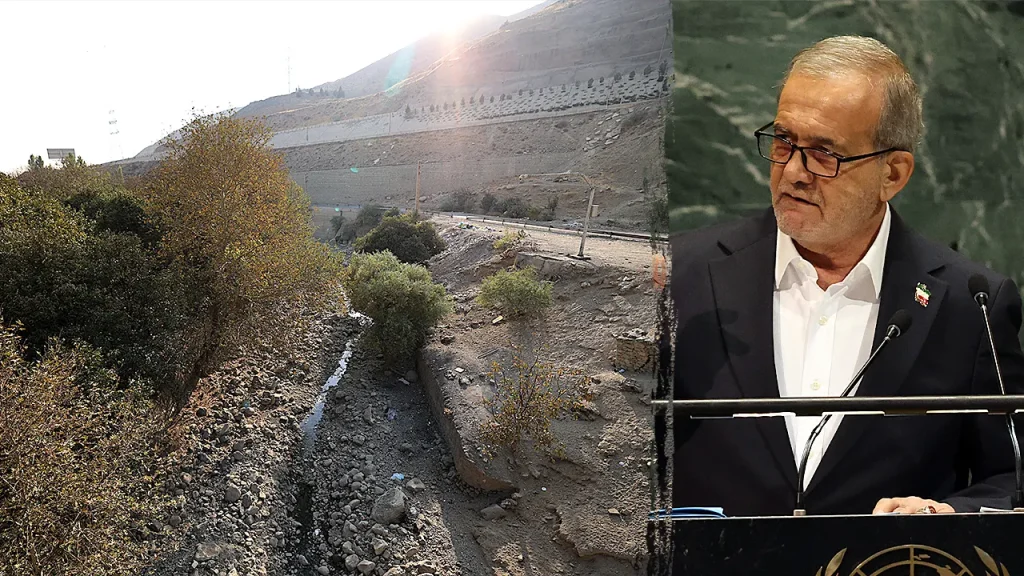Listen to the article
Iran Faces Unprecedented Water Crisis, Threatening National Stability and Nuclear Ambitions
Iran is confronting its most severe drought in decades, a crisis that could force partial evacuations in Tehran and poses a significant threat to the regime’s stability and nuclear capabilities, according to leading environmental experts.
Kaveh Madani, Director of the United Nations University Institute for Water, Environment and Health, warns that Iran’s worsening “water bankruptcy” will fundamentally impact the nation’s ability to function and weaken its position internationally.
“This water bankruptcy weakens Iran on the world stage,” Madani told reporters. “If they want to stick to their ideology and fight with the West, they must use their natural resources and burn them, so if there is no water, there is less resilience and less capacity to resist.”
The water crisis has reached alarming proportions in Tehran, where President Masoud Pezeshkian has warned that without significant rainfall before winter, the capital may face partial evacuation. Of the five major dams supplying Tehran, one has already run dry while another is operating below 8% capacity.
Energy Minister Abbas Alibadi recently announced that water supplies will be cut off during some evenings to refill reservoirs and urged citizens to reduce consumption by 20% to avoid more severe rationing measures.
“The symptoms were already present, and now the flames are undeniable,” Madani explained. “We are discussing Day Zero, when the taps would run dry in Tehran and other cities once immune to shortages.”
The crisis represents the culmination of decades of environmental mismanagement, according to experts. “The water bankruptcy situation was not created overnight,” Madani noted. “The house was already on fire, and people like myself had warned the government for years that this situation would emerge.”
Climate change has exacerbated the situation, with prolonged drought conditions depleting water reserves across the country. The consequences extend beyond basic human needs to critical infrastructure, including Iran’s energy and nuclear facilities.
Despite U.S. claims that airstrikes destroyed Iran’s nuclear facilities, recent intelligence reported by The New York Times suggests ongoing uranium enrichment at a fortified site known as Pickaxe Mountain. However, the water crisis threatens these operations as well.
“If water and electricity shortages persist, any nuclear program would also be impacted,” Madani explained. “Lack of rain means less hydropower generation, leading to both water and power outages.”
The crisis is further complicated by international sanctions. The U.S. and its allies reimposed sweeping restrictions on Iran’s oil exports and banking sector following the collapse of the 2015 nuclear deal, limiting the country’s ability to address its water infrastructure needs or import necessary technology.
“Iran is in resistance mode, and remaining in this mode means increased pressure on Iran’s ecosystem, natural resources, and water,” said Madani. “It also means heightened concerns about food insecurity issues and dependence on food imports.”
While President Pezeshkian has raised the possibility of evacuations, Madani believes a mass exodus from Tehran remains improbable. “People have jobs, children are in school, so it can’t happen overnight. The government hopes for rain, but people are already afraid.”
The water crisis may also destabilize the regime internally. “When people are out of water and electricity, you face domestic and national security problems that even Iran’s enemies, not even President Trump or Prime Minister Netanyahu, could have wished for this to happen,” Madani warned.
As Tehran faces the prospect of dry taps and power outages, the Islamic Republic finds itself in an unprecedented position of vulnerability, with its natural resources depleted and its capacity for both domestic governance and international posturing severely compromised.
Fact Checker
Verify the accuracy of this article using The Disinformation Commission analysis and real-time sources.




9 Comments
This water bankruptcy issue is deeply concerning for Iran’s stability and international standing. It underscores the broader challenges posed by climate change and resource scarcity that many countries will increasingly face in the years ahead.
This is a serious issue for Iran. Water scarcity can undermine a country’s stability and security in profound ways. I hope the government is able to take effective measures to manage this crisis before it spirals further out of control.
I’m curious to see what specific policy interventions the Iranian government plans to implement in response to this water crisis. Desalination plants, water recycling, and agricultural reforms could all play a role in mitigating the situation.
While the situation in Iran is dire, it’s important to remember that water scarcity is a global challenge that requires collaborative, multilateral solutions. I hope the international community can provide support and expertise to help Iran navigate this crisis.
The potential for partial evacuations in Tehran due to water shortages is quite alarming. This highlights the urgent need for the Iranian government to develop comprehensive, long-term water management strategies to ensure the well-being of its citizens.
The connection between Iran’s water crisis and its nuclear program is an interesting angle. It suggests that environmental factors can have wide-ranging geopolitical implications that policymakers must grapple with.
Absolutely. The intersection of natural resource constraints and nuclear ambitions adds an additional layer of complexity to the already tense situation in the region.
The impact of this water crisis on Iran’s nuclear program is quite concerning. Without adequate water resources, their ability to power critical facilities and maintain operations could be severely compromised. This adds another layer of complexity to an already delicate geopolitical situation.
You raise a good point. Water is an essential input for nuclear energy facilities. If Iran cannot secure sufficient water supplies, it could significantly disrupt their nuclear ambitions.